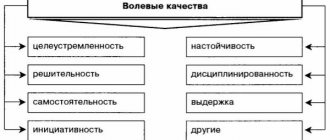“Personality is a system of its relationships in which it manifests itself in its entirety and integrity” (definition by V. N. Myasishchev).
Dominance through control and aggression is the main pattern of a psychopath's attitude towards other people. This is his personality: to subjugate those around him is the deep motivation of his actions. Of course, they cannot directly voice their desire to the authorities, which is why they so often resort to games and manipulations so as not to be seen through. You can run into a psychopath if you are waiting for a prince on a white horse and want to get “everything at once.” He will easily pick up the key. It will play on a child’s desire to get into a fairy tale and feel like a princess. The consequences of communicating with a psychopath are severe: you will feel humiliated, trampled, and used. Health, self-esteem, and opportunities for fulfillment suffer. A psychopath could be a husband or wife, a parent, a boss, a girlfriend, a client, or your child. They have incredibly powerful energy and can be charismatic and attractive.
My father came up and just screamed very loudly in my ear - AHH! And he laughed. He constantly pinched me, poked me with his finger, slapped me on the ass, loved to step on my feet. All this with a satisfied, sadistic smile on his face. And yelling and swearing - it was actually something with something.
We've been in a relationship for two years now. When we started living together, I realized that something was wrong. The guy doesn't allow me to communicate with anyone. I was forced by threats to install a program on my phone that monitors my movements. Any attempts to object to him ended in many hours of conversations. As a result, he gradually convinced me that I was wrong. I'm afraid to leave him. I'm afraid that he will haunt me.
We met, showed only the good side of himself, a prince on a white horse. Then he began to sharply pressure me to feel guilty. Lured out candid photographs. He began to blackmail me with them, saying that he would tell everyone how anxious I was, that I provided sexual services for money. At that time, I took him seriously and was really afraid of him, so I followed his lead. Now I understand that these were childish manipulations. These actions took a toll on my psyche and health. Many years have passed, but the terrible anxiety and periodic panic attacks remain. I just can't do anything because I feel unworthy. This man also forced me to have sex through manipulation. In fact, he and his creepy face made me sick.
A person with a psychopathic character structure failed to experience a feeling of attachment in early childhood. Therefore, there are no “good” images of love and support within his mental field. He achieves his goals by relying on omnipotent control over others: by dominating, establishing dominance, or deliberately manipulating others. He is similar to a vampmir, a “living dead” who sucks the strength and energy of victims. Due to the scarcity of emotional life, a psychopath is always bored, and this pushes him to sadistically act out for fun. Under no circumstances can a psychopath feel vulnerable; it is extremely important for him to feel omnipotent. Weakening of defenses can lead to psychotic decompensation: hallucinations, delusions, changes in thinking, speech and behavior, “withdrawal syndrome”, when suddenly a person lies down silently and does not answer questions.
Signs of a psychopathic personality:
1. Demonstration of their power gives them great pleasure. They experience a sadistic nature of excitement from persecution and attack. 2. The mask of strength masks hidden psychosis: the inner world is chaotic and not adapted to reality. 3. They cannot be sincere. All their behavior is permeated with manipulativeness - techniques hidden from the victim’s awareness, forcing others to act contrary to their interests and desires. 4. Dishonest, deceitful, love to weave intrigues. 5. They feel superior, they are proud, their self-esteem is inflated. 6. They know how to adapt, please, and make a good impression at the first meeting. 7. They don’t feel the pain of another, they don’t empathize. Cold, cruel, contemptuous. 8. There is no conscience, they do not feel guilt and shame because of their cruelty and meanness. They don't repent. Until the last minute they will refuse and turn the tables. 9. They cannot love anyone but themselves. They don't respect people's feelings and their personal space. Their feelings are superficial, pretentious, false. 10. They do not take responsibility for their actions. 11.They need to be constantly praised. They need constant approval, care, and praise. 12. They love to live at the expense of others and calmly exploit others. Parasites. 13. In childhood and adolescence, they are pugnacious and show aggression. They violently express their anger and resentment. Easily insulted. 14. Often have an intriguing and attractive mixture of sexuality and aggressiveness. 15. Their lives are extremely reckless, they often get involved in financial scams, and are sexually promiscuous.
What are the types of psychopaths?
The types of psychopaths identified in psychiatry differ in the characteristics of their manifestations and the degree of their severity. Determining the type of psychopath will allow people who are forced to contact him to smooth out rough edges in communication.
Hysterical psychopath
The hysterical or hysterical psychopathic personality type is more often observed in women. Such patients strive by any means to get into the spotlight. The lack of a positive assessment of their creative and working qualities becomes the cause of uncontrollable and inadequate emotional reactions.
An acute reaction to any criticism makes it difficult to interact with such a person. Hysterical psychopathic individuals often use their ugliness or attractive appearance, constantly deceiving and flattering to achieve their goals. They often throw fake tantrums.
Schizoid psychopath
People with this type of disorder have congenital schizophrenic personality traits. Such people are characterized by an inadequate assessment of current events and their role in them. They can behave unpredictably. There is no harmony and naturalness in behavior. Often the speech of such people does not agree with their facial expressions. Speech is often characterized by pathos and ornateness; in some patients, on the contrary, it becomes inexpressive and meager.
They may exhibit inconsistent behavior. Often such people are withdrawn and do not trust others. They often become vagabonds because... cannot exist in society. It is not uncommon for such people to be creative, but their work is difficult to understand. Increased daydreaming and inability to cope with life's difficulties are possible.
Paranoid psychopath
This form of disorder is accompanied by the emergence of suspicions regarding the presence of insidious plans among others in relation to the patient. Suspicions of bad intentions prevent people suffering from this form of psychopathy from building normal personal and work relationships.
Individuals suffering from this disorder are observant and meticulous. They often show an unhealthy interest in other people's personal lives and emotions. With this form of the disorder, patients have a tendency to pathological jealousy and the formation of overvalued ideas.
Asthenic psychopath
Asthenic psychopaths are distinguished by a tendency to increased irritability, rapid mental exhaustion and attacks of anger. Among this type there are hypochondriacs, who are distinguished by excessive neuropsychic excitability, increased fatigue, apathy, lethargy and lack of initiative.
In addition, there are enthusiastic asthenics in whom the personality is captured by individual interests. Such people are quick-tempered and irritable. They quickly get tired, which leads to the onset of apathy. Often there are patients characterized by increased impressionability. They are often too sensitive and insecure to take any action.
Dissocial psychopath
People suffering from this form of pathology have all the signs of underdevelopment of higher moral feelings. They often do not adhere to any social norms and often lead a criminal lifestyle. Such patients live according to the “here and now” principle, without worrying about the future. They are almost incapable of self-restraint and self-control. They lack willpower.
How a psychopathic personality is formed: basic theories
Transcript of the report by professor, certified practicing psychotherapist, Jungian analyst Valeria Golyanich
source
Psychopathy is a common phenomenon in society. This is a property of character and behavior. This personality type has always existed. He attracted the attention of both writers and film directors. They have amazing energy. They frighten, they fascinate, they attract. The man seems paradoxical. They do not fit into the norms of morality and morality. We are watching him closely. Antisocial behavior often occurs. But it is important to know that they are not only correlated with psychopathy. “Conceptually, the diagnosis refers to a basic lack of human affection and commitment to very primitive defenses” (Nancy McWilliams). The etiology of the disorder is clearly stated: lack of attachment. Why does it occur? How is character formed? What does it lead to?
Neurobiology of psychopathy.
Research in recent years suggests that there are some neurobiological prerequisites for the occurrence of psychopathy. Due to a lack of love, parental hostility or indifference, a defect in neurobiological development occurs in the form of underdeveloped neural networks between the brain stem and limbic (emotiogenic) brain structures. Hence, the activity of the brain stem is kept at an above-average level, and the activity of underdeveloped limbic neural connections is kept at a below-average level. Atrophy of important neural networks occurs. Therefore, a person cannot form an understanding of the emotions that arise in human relationships. As if there is an emotional block, they cannot understand their feelings.
Enzyme monoamine oxidase-A (MAO-A). The enzyme is involved in the metabolism of important hormones: adrenaline, norepinephrine, serotonin, histamine, dopamine (hormones of anger, fear, joy). The enzyme has two forms: active and low-active. Children with a low-active form of the enzyme tend to develop a psychopathic personality structure under conditions of harsh treatment. And children with a highly active form of MAO-A, even under conditions of harsh treatment, are not inclined to develop psychopathic character traits. That is, there is no genetic or social predetermination, there is a combination of these factors. There is a genetic predisposition to psychopathy, innate aggressiveness.
There is a genetic link between social influences and genetic predisposition.
Psychoanalytic theory of psychopathy
Psychoanalysis described the genesis of psychopathy. The child grows up in conditions of constant threat and chaos, without loving and protective relationships. Harsh treatment, neglect, devaluation. The mother is weak, passive, the father is tough and aggressive. Normal attachment is not formed. The child does not learn to love and accept love. A positive internal object is not formed. The child cannot identify himself with a good object. At 10-11 months of life, identification arises with the exploitative self-object, the archetypal predator, as the Jungians say. Thus, the child does not develop the infantile feeling of primary infantile omnipotence and defects of secondary “dependent” omnipotence arise. In the subsequent period, the child cannot accept his weakness and vulnerability. He develops a chronic desire to confirm his own omnipotence. This idea of omnipotence captures him and accompanies him throughout life. This is the core personality of a psychopath, which pushes him to do things that confirm his strength.
Analytical psychology
The destructive power of cruel upbringing. A harsh, cold, devaluing, ignoring attitude towards a child leads to the fact that the consciousness that is being formed cannot be separated from the unconscious. Consciousness immersed in the unconscious is unable to identify with good self-objects. Because these good objects do not exist. Due to the lack of good objects, the child’s inner world is captured by an evil and primitive archetypal figure of a predator. Identification occurs with the numinous archetypal image of the predator, and an inability to establish a genuine connection with others and one’s Self is formed. Such a child displays the entire destructive identity in his behavior. At the early stages of development, the processes of differentiation between good and bad, between sexuality and aggressiveness, between good and evil were inhibited. The main dominant behavior is to prove to others that he is brave, strong, smart, that he can control those around him.
The psychopathic person's basic transference is that of an archetypal predator: the "other" is perceived as either prey or a rival predator.
- relatively undeveloped ego, unable to feel affection for others
- strong identification with the Predator archetype deprives the psyche of the opportunity to develop and transform
- an underdeveloped superego, which leads to the projection of guilt, lack of moral boundaries, and adequate impulse control.
- survival, integration and significance are achieved through acts of dominance, manipulation, control.
- the spheres of sexuality and aggression become mixed, so their conscious differentiated manifestation is impossible.
Three powerful psychological processes that hinder the development of consciousness (EGO):
- Opposites in the unconscious are not differentiated due to the absence of “good” objects. There is no differentiation between good and bad.
- The nascent individual consciousness during the critical period when a normal 9-month-old child will experience fear of strangers is identified with the alien Predator archetype. Development in the absence of “good” internal objects stops.
- Identification with the inhuman essence of the Predator interferes with normal interactions with people and covers the consciousness with a veil.
Behaviorism
Parenting with a lack of stable discipline and the replacement of emotional contact with material rewards, the inability of parents to adequately respond to the emotional needs of the child leads to the fact that he begins to ignore the needs of other people and allows himself to do what he wants. He is convinced that he can cope with his favorite undesirable consequences by running away, dissimulating, seducing, intimidating others. Parents lack either the time or the psychological strength and energy to take care of an energetic and strong child. A psychologically powerful child, energetic from birth, hyperactive. One parent can't handle it. Therefore, ideas of omnipotence, immorality, aggressiveness, and asociality arise. He is unable to accept his weakness, vulnerability. Chronically strives to confirm his own omnipotence.
How to recognize a psychopath
This is a person with a certain set of specific traits. Psychologists and psychiatrists describe psychopaths as charming, emotionally abusive, manipulative, and potentially criminal. According to expert estimates, approximately one percent of the Earth's population has such a deviation. Such people are excellent at camouflage, so they are perceived by others as completely normal, attractive individuals.
Not all psychopaths are violent, but they pose a threat to society, especially among people with criminal records. The actions of the sick are destructive to human nature. An excitable psychopathic personality has inflated demands on others; it is characterized by: conflict, easy entry into a state of rage, and even the ability to kill. Psychopaths are predators in society, as evidenced by the following traits:
- the ability to feel someone else's pain, but remain indifferent;
- ability to manipulate, cunning, resourcefulness;
- laziness, parasitic lifestyle, lack of desire to work.
Types of psychopathy
In practice, the following types of psychopathy are distinguished:
1.Asthenic type, when there is increased irritability and rapid exhaustion.
2. Excitable type, when there are outbursts of anger, inappropriate emotional reactions.
3.Hysterical type, when a person is characterized by impressionability, egocentrism and suggestibility.
4. Paranoid - with the manifestation of suspicion, high self-esteem, and a tendency to impose overly valuable ideas.
The types of psychopathy for each person are determined individually, based on their behavior.
Signs of psychopathy
Psychopathic deviations are accompanied by a number of symptomatic manifestations. People suffering from the disorder are not capable of long-term relationships. Pathology is often manifested by the desire to establish relationships only with those people who can bring material benefit. The patient deliberately ignores existing norms of behavior. The following signs may indicate the presence of this disorder:
- superficial charm;
- hypertrophied sense of self-esteem;
- rancor;
- short sleep duration;
- pathological deceit;
- outbursts of rage;
- inconsistency in actions;
- frequent change of place of work;
- sexual depravity;
- inability to assess the degree of danger;
- frequent change of character masks;
- accusing the opponent of shortcomings and lies at the slightest dispute;
- own set of moral laws;
- presence of high intellectual abilities;
- charm and visual attractiveness;
- out-of-the-box thinking.
Psychopaths are characterized by attacks of groundless jealousy, irresponsibility and impulsiveness. Such individuals often try to sow chaos and discord around them, because... By quarreling other people, they get pleasure from it. They lead a parasitic lifestyle. They cannot be relied upon in an emergency.
In men
Men suffering from psychopathy are distinguished by thoughtful tactics of behavior in society. They often hide or smooth out facts to their advantage. The behavior of a psychopath in most cases is hypocritical, so in public and in the family they are 2 different people.
Among women
A psychopath is characterized by emotionality and hot temper. Such women are unbalanced. Despite their outward goodwill, psychopaths are extremely hostile towards others. Especially often their aggression is directed at other women, communication with whom cannot bring them material benefit. The patient is dismissive of the feelings and problems of her family.
Patients suffering from this disorder have too much selfishness. It begins to appear in adolescence. Despite her attractiveness in the eyes of men, such a woman is not able to experience feelings of love and affection. Such women often build relationships on cold calculation, leaving their partner as soon as personal interest is realized or a better candidate appears. The patient is not able to love even her children. They are often the ones who suffer the most from her words and actions.
In children
Psychopathy can have different manifestations in childhood, because During this period, the child is just learning to communicate with others. Some children already at an early age acquire the skills to manipulate the feelings of others and show signs of selfishness. In other cases, children with this disorder have difficulty communicating with peers. They gradually hone their manipulation skills. Possible behavioral problems.
Diagnosis of psychopathy
Psychopathy, or personality disorder, draws attention to itself in the discrepancy between a person’s behavior and the social norms existing in society.
Psychopathy is diagnosed if the patient has three or more points from the following criteria:
- Indifference, often callous to the feelings of other people.
- Irresponsibility, disregard for social norms, rules and responsibilities.
- Inability to build and maintain relationships with people.
- Lack of ability to withstand failures that arise, increased struggle to fulfill one's needs and desires, possibly with signs of aggression, even including violence.
- Lack of guilt, inability to analyze one’s life experience and benefit from it, especially from the punishments received.
- Constant conflict with society, which arises due to a pronounced tendency to blame others for everything, plausibly justifying one’s behavior.
When diagnosing, in addition to general criteria, symptoms of psychopathy can be manifested by the following points in a person’s behavior:
— disrespect for laws, their violation, leading to arrests;
- frequent lies, hypocrisy, deception of others for personal gain;
- inability to plan, impulsiveness;
- severe irritability, aggressiveness, manifested in frequent fights;
- lack of a sense of security for yourself and those around you, excessive risk-taking;
— irresponsibility, inability to withstand the intense pace of work, to fulfill financial obligations;
- causing moral or physical harm to other people without feeling guilty afterwards, theft, etc.
Treatment of psychopathy
It is impossible to completely eliminate this violation. Some patients with psychopathy recognize that they have characteristics that make it abnormal for other people to live with them. If a person himself is aware of the presence of a problem, psychocorrection turns out to be more effective.
The patient can learn to control his impulses and change his attitude towards others. Family psychotherapeutic consultations and explanatory conversations with the patient can be of great benefit. Hypnosis is often used. In especially severe cases, psychotropic drugs are selected for patients.
Who is a psychopath
People suffering from this disorder are characterized by a lack of any empathy, guilt and remorse. This disruption leads to perverted and immoral behavior. At first, such individuals may seem normal, pleasant to talk to and friendly, but it must be taken into account that they are capable of masterfully copying emotions in pursuit of their goals.
Thus, psychopaths are social predators. Many famous people have had this disorder. Often, a person’s psychopathic character manifests itself in the fact that, using manipulation and deception, he directs all efforts to the social destruction of another person for his own pleasure.
A psychopath's brain can perceive other people's emotions, but he cannot experience them. At the same time, such a patient does not experience any disturbances of consciousness. Thus, a person suffering from this disorder, by harming other people and manipulating their emotions, has a good understanding of his actions and is aware of their consequences.
Many people confuse concepts such as psychopath and sociopath. These mental disorders have many differences. If a psychopathic person always tries to communicate with other people to gain benefits, then a sociopath experiences difficulties in communicating and understanding the actions of others. Often sociopaths lead secluded lives and try to reduce their contacts with other people to a minimum. However, both of these conditions entail impairments in the ability to sense emotions and understand the feelings of others.
Signs
So, let's now look at the main signs by which you can easily determine the presence of a person with psychopathic tendencies nearby. Believe me, it is not that simple, despite the types described above. They are often completely indistinguishable from other people and do not arouse suspicion, especially at the beginning of acquaintance. They are friendly, listen to your wishes, are caring and compassionate.
But this is only for a certain period, then, realizing that you have fallen into a trap, he shows his true face, turning your life into a nightmare. So, the main “bells” by which you can identify this “emotional monster”:
Seems perfect
Only after getting to know each other, he recognizes your needs, desires and weak points, therefore, masterfully pulling the right strings, he conquers you, showers you with attention, shares your views on life, opinions and even interests. Usually men behave this way; it seems that finally a miracle has happened and a person has appeared in life who can understand you. Relationships with him develop at the speed of light, all his hidden dreams and fears are revealed to him, stories that no one knows about, and so on.
The only difference with normal relationships is that this fairy tale is interrupted in an instant. The partner tries to behave in such a way as to earn favor again, but nothing helps, which is why the victim, being in despair, is ready to do anything just to feel loved again.
Plays on feelings
May tell sad stories, wanting to evoke pity and other feelings that upset you and cause pain. Over time, you will find that there are too many tragedies surrounding him. Then, you will either doubt the veracity of the stories, or you will want to help in order to make life easier for such a good and undeservedly suffering person, whom those around him offend and betray.
Getting involved in a love triangle
It is not necessary that he will cheat, you will just get the impression that the partner is very popular among the opposite sex. Therefore, even if you are not jealous, there will come a time when you will lose your appetite and sleep, wondering where he is and with whom, and whether he still loves you.
You will be aware of all his previous relationships, and even with comparative characteristics, at first in your favor, as well as about all calls and manifestations of attention. If you don’t react, believe me, he will still find a weak spot on which he will put pressure.
Reality distortion
Whatever you say, any words and actions will be “twisted” and used against you. Attempts to introduce a rational element and refute misinformation will be stopped instantly, you will be accused of all mortal sins. So the only thing that remains is to give up trying to prove the truth and agree that the blame for something lies with you, and you yourself are gradually going crazy.
It’s a bit similar to the behavior of perverse narcissists, as you can see by looking at the article “How to recognize a perverted narcissist and how to resist him so as not to become a victim.”
Provocation
It brings you to an extremely tense and unbearable state, then accuses you of inadequacy. For example, he allows himself to flirt with someone in front of you, and then denies this fact, which makes you look like the most jealous person.
Or at a party he will gradually infuriate you until you lose your composure and attack him with rage, which will expose yourself in a completely unsightly light; those around you will sympathize with this psychopath, considering you a tyrant.
Constant lies
Such individuals lie simply for the sake of lying. And even if you “pin” it to the wall, you will not receive any repentance. Such a person is ready to spend resources on coming up with an excuse, but the idea that it is necessary to correct the situation and atone for guilt will not even occur to him. He doesn’t care at all about your suffering, fatigue from all this, and so on.
Unexpected ignoring
At first, you will receive hundreds of messages about how bored he is, and then everything will disappear, you will feel the coldness emanating from him, trying to understand the situation, you will feel that you are directly stressing him with your presence.
And when you torment your soul with suffering, having decided that you have lost him, he will appear as if nothing had happened, surprised that you “cheated” the movie for yourself. After which the situation will repeat.
8. Targeted reduction in self-esteem
To gain power and control over you, he will try to introduce the idea that no one needs your worthless personality, and you should be grateful that he still tolerates you.
But as a result, at first you will lose ground under your feet from the number of admiring responses from him. After which, slowly but surely, humiliations and insults will begin, which you will simply have to silently swallow and endure, otherwise see point number 5.
Egocentrism
Only one individual has the right to be at the center of the Universe, and this, of course, is him. Even if the victim turns out to be a woman, attention, worship and admiration should be directed only to him.
Personality change
Subsequently, close contact with such a monster will affect not only your character, but even your physical health. Insomnia will appear, chronic diseases will appear, strength will be lost, and it will seem that there is no strength to move further, and in general, there is no point in living either.
Not only your inner world will be destroyed, but also your relationships with others, even with your family, because wasting time on others was not permissible for you, and it was easier to agree with this statement than to start challenging it and risk losing it.
Treatment of psychopathologies
In the prevention of decompensation, the main importance is given to measures of social influence: proper upbringing in the family, school, measures for adequate employment and social adaptation, corresponding to the mental make-up of the individual and level of intelligence. In the compensation stage, psychopathic individuals do not need treatment. For decompensation, both psychotherapeutic methods (explanatory psychotherapy, autogenic training, hypnosis, family psychotherapy) and drug treatment are used. Psychotropic drugs are prescribed individually, taking into account psychopathological reactions and personal characteristics. In individuals with predominantly emotional fluctuations, antidepressants are successfully used; for severe hysterical reactions, small doses of antipsychotics (aminazine, triftazine), and for states of anger and aggressiveness, also antipsychotics (tisercin, haloperidol). In cases of pronounced behavioral deviations, “behavior correctors” such as neuleptil and sonapax are successfully used. Severe asthenic reactions require the prescription of stimulants (Sidnocarb) or natural drugs with a mild stimulating effect (ginseng, Chinese lemongrass, zamanika, Leuzea, Eleutherococcus, etc.).
The selection of drugs, doses and methods of their administration is carried out by a psychiatrist. For the period of decompensation, temporary loss of ability to work is determined with the issuance of a sick leave certificate. Patients are transferred to disability extremely rarely, under aggravating circumstances. The prognosis is generally favorable.
Read more:
- Manic-depressive psychosis: symptoms and treatment
- Reactive psychoses in traumatic situations
- Schizophrenia: symptoms, types of schizophrenia and treatment methods
- Delirium tremens and other alcoholic psychoses
Distinctive Behaviors
It is possible to identify a number of behavior patterns that, when expressed intensely, are characteristic of psychopaths. However, people suffering from this disorder can change them. Changes in behavioral patterns can occur suddenly if necessary to achieve a goal.
Desire for dominance
Almost all patients are distinguished by pronounced narcissistic and dominant tendencies. With this disorder, people inadequately assess themselves and their own importance. They are often distinguished by an inappropriate, exaggerated sense of entitlement. Their sense of fear and danger is smoothed out. They are distinguished by their ability to charm people. Often, a pronounced tendency to dominate has a positive effect on a person’s ability to build a career, but greatly interferes with his personal life.
Emotional Indifference
Both women and men suffering from psychopathy are characterized by emotional indifference. They can only build superficial relationships. They are incapable of empathy and sympathy. A study involving people with this disorder revealed a lack of neural networks in their brains that are normally responsible for sensitivity and anxiety.
Tendency to aggression
Not all psychopaths, despite their cruelty in judgment, display a tendency to act aggressively. Violent acts are most characteristic of individuals characterized by weak self-control. Both women and men with this disorder often resort to psychological violence. Outbursts of rage may cause physical harm
Thrill seeking
This disorder predisposes to the development of a pathological thirst for adrenaline. They do not fully understand the danger and possible consequences. They prefer extreme sports. They often impulsively commit actions that are potentially dangerous to themselves. Patients do not like to obey rules and consider themselves above the laws. Despite the fact that they try their best to avoid going to prison, they often break the law, realizing the illegality of their actions and without feeling guilty.
Desire for manipulation and personal gain
Patients seek to manipulate the feelings of others for their own moral satisfaction or material gain. They are pathologically deceitful. Often, people with this disorder use kindness and goodwill to achieve their goals.
Self-centeredness and irresponsibility for one's own actions
With this disorder, people tend to justify any of their actions. They often blame others. They often try to impose a feeling of guilt on their victim. People with this disorder often do irresponsible things, but never take responsibility for their actions.
Artificially created traumas when raising psychopaths
What does family and school do with them?
Psychopathic character traits begin to appear in childhood in the form of “hyperactive child syndrome.” True, similar manifestations can also occur in those who have paranoid traits.
For obvious reasons, they try to teach psychopaths from childhood to order, discipline and perseverance. The theme of order and discipline for many years becomes dominant in the agenda of their family, and then in school life. That is, the efforts of parents are usually aimed at overcoming those character traits and behavioral manifestations that constitute the core character of a psychopath.
In those cases where the family and school manage to break off a psychopath, we get a hot-tempered, scandalous creature, always rebelling against something, sometimes suffering from various physical illnesses, with a bunch of minor and serious physical injuries behind him. Psychopaths “broken off” by family and society can also escape from reality into computer games, very often they become gambling addicts.
In those cases when parents turn out to be too compliant or helpless in front of the violent energy of a little psychopath, we are faced with the situation of a spoiled child. Usually spoiled psychopaths are severely broken off by the social environment.
Traumatized psychopaths
No matter how much energy and vitality a child with a psychopathic type of character has, but a collision with an unfavorable family environment for him, as well as with the resistance of an aggressive or unfair society, inevitably leads to the appearance of certain psychological traumas. And we very often deal with traumatized psychopaths.
Formation of a dramatic and depressive picture of the world
If the life impulses of a psychopath encounter resistance from society, and even more so counter-aggression and injustice, then he develops a very dramatic and negative picture of the world. At the same time, he can retain the desire for an intense and dynamic life, including the achievement of individual feats, but he is no longer able to experience the exuberant joy of life.
Despite the fact that psychopaths, in principle, are not very vindictive, and they are easy-going, not prone to revenge and accumulation of grievances, but consistent encounters with pressure and aggression from society, nevertheless, can lead them to the formation of various types of life attitudes:
- They may decide that since the world is cruel and unfair, then they too must play by its own rules. That is, the dramatic and negative picture of the world is internalized and becomes, as it were, the content of their psyche. They themselves become angry and aggressive and begin to live “according to wolf laws.”
- They turn into fighters against social injustice. Psychopaths rarely turn into Batman, as happens with people of a paranoid personality type. They lack the charge of a social idea for this. Their protests most often boil down to arrogance and troublemaking, which brings a lot of problems in their personal careers.
- They become antisocial people. You cannot trust society, but there is nature and animals that, unlike people, do not deceive, betray, or limit their personal freedom. Well, as already mentioned, there is the opportunity to go into virtual reality.
What happens if a psychopath's life energy goes inside his psyche.
For a person with psychopathic character traits, the saddest consequences of a collision with society is withdrawal into his inner world. The psyche of a psychopath differs significantly from the inner world of, for example, schizoids. If for schizoids the inner world is a window into the collective unconscious or an exit to some other and special reality, then the inner world of a psychopath is simply a social reality turned inward.
Unable to actively act in the social situation around them, psychopaths can begin to act out this drama within their psyche. If a child cannot resist an adult who is superior in strength, then he has the illusion that he will be able to cope with the image of this person internalized in his psyche.
As a result, those dramas that should have occurred in external life begin to unfold in the human soul. All this leads to increased internal tension, hot temper and outbursts of aggression and anger over seemingly insignificant reasons. Very often, the internal drama of a psychopath has no chance of resolution; it turns into a battle of attrition.
When directing the vital energy of a psychopath, as well as the energy of his social protest, into our psyche, we are faced with a number of phenomena such as:
- pseudodepression,
- pseudopsychasthenia,
- imaginary schizoid psychosis.
Unlike ordinary depression, the “pseudo-depression” of a psychopath is accompanied by increased internal tension and rapid dynamics in his psyche. The echoes of these internal battles always break out in the form of outwardly unmotivated aggression towards people nearby.
Pseudopsychasthenia, observed in psychopaths, is also accompanied by signs of increased internal tension. Lack of energy and rapid exhaustion are accompanied by increased tone in various parts of the body. We can observe an abundance of not only muscle clamps, but also what could be called “mental clamps” that block emotions, feelings and even intellectual activity.
Having allowed his inner world to be populated with images of his parents and other powerful characters, a psychopath may not be able to control the levers of his psyche in his hands. Identifying with one or another hero of his inner drama, he begins to make decisions and life attitudes that contradict each other. Not only cognitive, but also “psychological dissonance” arises in his soul, which can outwardly manifest itself in something similar to “split personality” or senseless and contradictory nonsense.
Having the ability to identify with different people who are significant to them and the ability to get used to their role, psychopaths turn out to be not very capable of dialogues and compromises. They feel the validity of different points of view and views on the situation, but if there are several such points of view and they are contradictory and even hostile to each other, then difficulties arise.
Incapable of long-term analysis of accumulated problems, psychopaths make a “volitional solution” to the situation. The vision they put forward of what is happening may seem, to put it mildly, not very adequate to an outside person. And psychopaths themselves cannot stick to their decisions for a long time. As a result, their internal state and external activity may resemble a state of psychosis.
How can you help a psychopath become harmonious and realize himself?
Psychopaths find it difficult to be consistent and do the same thing for a long time; their activity is usually impulsive and unstable.
For this reason, raising a little psychopath can be directed in two directions:
- Make his current hobbies more sustainable and longer lasting.
- Ensure that they are interested in growing and improving within their passions, so that their passions enable them to move on to higher levels, with greater degrees of challenge, requiring the use of a broader set of skills and knowledge
If they manage to “immerse” a psychopath deeply enough in the material and content of some activity, then they can move mountains. The problem, however, is that immersion in the material usually requires the performance of some kind of the same type and monotonous effort, so teaching psychopaths to this “starting effort” is the main task of the parents who love him.
You should not try to force a psychopath into the material he is mastering; it is better to carry out such immersion in several stages, preferably in the form of an exciting game or competition that is harmless to him. When the critical barrier of immersion in the material is overcome, psychopaths start their “internal engine”, and after that all the difficulties that arise along the way become just fuel that is burned in this furnace.
Psychopaths are very loyal to their friends and hate or despise their enemies, although they are not very vindictive. If parents become not supervisors, but friends of psychopaths, then they reciprocate their friendship and devotion. And for the sake of this friendship, they are able to perform personal feats, including performing monotonous and boring work. Unfortunately, in school conflicts, parents usually take the side of the “justifiably angry” school administration, and not their mischievous offspring, and thus they lose their children’s friendship, joining the ranks of their “class enemies.”
It is worth noting that during periods of passion for some activity or game, psychopaths can very quickly and thoroughly master large amounts of knowledge, information and develop many useful skills. In terms of the speed of mastering new material, they can be significantly ahead of other children.
The inner core of this psychotype
The internal core of the psychopathic type of character is the will to live and intolerance of restrictions on personal freedom. For psychopaths, it is important to constantly experience a sense of fullness and intensity of life, so they love risk, intense experiences, intense communication, intense activity - an intense and dynamic life.
We can say that psychopaths are people with excessive surges of vital energy, which they do not always know how and what to spend. For this reason, they react so painfully to strict rules and restrictions on personal freedom.
Possible reasons
Psychopathy often originates from childhood.
This condition can develop with prolonged influence of unfavorable factors in the social environment that affect the formation of personality. Psychopathy is not considered a disease; it is believed that it is a reflection of pathological character deviations that could be caused by the following reasons:
- trauma during embryonic development or childbirth;
- congenital defects of the nervous system;
- genetic predisposition;
- brain damage that affects its functioning;
- alcoholism of one of the family members;
- past infectious diseases;
- regular exposure to social pressure.
The development of psychopathy can be influenced by errors in parental upbringing.
- Manifestation of overprotection. Parents take excessive care of their child, depriving him of the opportunity to become independent and withstand life's difficulties.
- Permissiveness. The situation when parents allow their baby to do whatever he wants, satisfies all his whims. As a result, a person grows up who considers himself overly significant, with inflated self-esteem.
- Free upbringing or neglect. The lack of necessary attention forces the child to adapt to life in society without anyone's help. This can lead to isolation in adult life.
- Despotic form of education. A child deprived of care and support, who is regularly punished and kept in fear, grows up as an insecure, weak person.
Find a psychologist in your city
Proven specialists with higher psychological education
AustraliaAustriaAzerbaijanArmeniaBelarusBelgiumBulgariaGreat BritainHungaryGermanyGreeceGeorgiaEgyptIsraelSpainItalyKazakhstanCanadaCyprusKyrgyzstanLatviaLithuaniaLuxembourgMexicoMoldovaNew ZealandPolandRussiaRomaniaUSATurkeyUzbekistanUkraineFinlandFranceCzech Republic SwitzerlandSwedenEstoniaJapan
Select city AktauAktobeAlmatyAtyrauIssykKaragandaKokshetauKostanayKyzylordaNur-SultanPavlodarPetropavlovskRidderRudnySemeyTaldykorganTarazTekeliTurkestanUst-KamenogorskShymkentEkibastuz
The course of character psychopathy
Psychopathy, unlike psychosis, is not a progressive disease. However, such statics of psychopathy is conditional. It is fair in relation to the preservation of the unity of the individual. A personality, depending on external conditions and the influence of other factors, can be adapted (compensated) or maladapted (decompensated). Compensation for a psychopathic personality is carried out in two ways. In the first, under the influence of favorable social conditions, pathological character traits are smoothed out. The second path is aimed at developing secondary psychopathic traits in order to adapt to the environment (overcompensation). Violation of social adaptation occurs, as a rule, under the influence of external factors (psychotraumatic situations, somatic diseases, social conditions), and decompensating factors must be significant for a given individual. For example, a conflict in the family will be a significant moment for an excitable psychopath and will not have any decompensating effect on a schizoid personality. Decompensation is usually a pronounced increase in personality characteristics. For example, depressive states more often occur in hypothymic or cycloid individuals, hysterical reactions - in hysterical psychopaths, ideas of jealousy or litigiousness - in paranoid ones. Reactions may occur that do not correspond to the nature of psychopathy, contrasting with the personality type. Thus, asthenic reactions appear in excitable people, and depressive reactions in hysterical people. This usually happens under conditions of a severe traumatic situation (death of a loved one, hopeless life situation, etc.). In such cases, shock reactions and reactive psychoses may occur.
Decompensation of psychopathy usually occurs during periods of hormonal changes in the body. The most significant in this regard are puberty (adolescence) and the period of involution (menopause in women). In addition, a sharpening of characterological characteristics in women is observed during pregnancy, especially in the first half, after abortion, unsuccessful childbirth, and before menstruation. Pathocharacterological development of personality, in contrast to psychopathy, is the result of improper upbringing in the family, prolonged exposure to unfavorable social and psychotraumatic factors, with the psychogenic factor being the main one. For example, in conditions of constant suppression, humiliation and frequent punishment, character traits such as shyness, indecision, timidity, and self-doubt are formed. Sometimes, in response to constant rudeness, callousness, beatings (in families of alcoholics), excitability, explosiveness and aggressiveness also appear, expressing a psychologically defensive reaction of protest. If a child grows up in an environment of excessive adoration, admiration, praise, when all his desires and whims are fulfilled, then such traits of a hysterical personality are formed as selfishness, demonstrativeness, narcissism, emotional instability in the absence of initiative and goals in life. And if he is also an ordinary person who does not actually possess the glorified talents, then he has to assert himself and earn the recognition of others in other ways (different appearance from others, unusual actions, writing different stories about himself, etc.). Sometimes it can be difficult to distinguish congenital psychopathy from pathocharacterological development of personality, especially since external factors play a significant role in the formation of congenital psychopathy.
Classification
First, let's look at what they are like depending on the accentuation of character.
Neurotic
Contrary to the expected bloodthirsty image, this type of psychopathy is weak, shy and timid. He has low self-esteem and a basically exhausted nervous system. She is exhausted due to the fact that he has a high level of impressionability, that is, for example, if he sees a drop of blood, he will lose his balance for a long time.
They are easily offended; even a meaningless squabble with a salesman in a store can pull the rug out from under his feet; he will be confused and, most likely, will not know how to behave and react. Because of this, he often suffers from insomnia and headaches.
Psychasthenic
A little similar to the previous type, only they differ in increased narcissism. Why is he constantly looking for flaws in himself and areas in which he is not yet perfect. He is pedantic and punctual, and demands strict boundaries from those around him.
Changes and changes are frightening, as he can imagine many terrible consequences for himself, almost leading himself to a nervous breakdown.
Schizoid
He is closed, does not let anyone get close, it seems that he is completely devoid of the ability to experience any feelings, since he is constantly cold and emotionless. But in fact, he knows how to worry only about his difficulties, thoughts and problems.
Other people's sorrows and troubles really leave him indifferent; he does not know how to become attached and love, which is why family partners usually suffer and, unable to withstand such detachment, file for divorce.
He is good in business, because he boldly and without any guilt “goes” over other people’s heads. And also in art - completely immersing himself in his inner world, and ignoring people who give feedback and assessment of his creations, sometimes completely to smithereens, criticizing him, he still does what he wants.
Paranoid
Overly stubborn, says whatever comes to mind, regardless of how his words are perceived by others, and whether they are generally appropriate. Unlike a schizoid, if you criticize a paranoid person and his creation, you will find an enemy for the rest of your life.
He is very vindictive, touchy and vindictive, on top of everything - he is inclined to think and invent, which is why he will inflate even a meaningless remark addressed to him to incredible limits.
Excitable psychopath (epileptoid)
This person is usually enraged by the slightest little thing, even its absence, but just as quickly as he “explodes,” he also cools down just as quickly, sometimes even repenting, which is why he becomes furious again.
He is constantly dissatisfied with those around him, finds fault with them and tries to prove that he is right. It is representatives of this type who are mainly persons with manic habits and other perverted deviations.
Hysterical
He is distinguished by feigned behavior and requires constant attention to his person. Feelings are so ostentatious that sometimes they resemble a theatrical production with the participation of one actor. A pathological liar, he needs this to get as much attention as possible, for which he tries every day.
If a person appears in his field of vision that amazes him, he will try in every possible way to copy her behavior, facial expressions and even voice. I don’t think it’s worth saying that he achieves success as an actor.
Affective
In turn, it is divided into three subtypes:
- Hypothymic is a person in a constantly bad mood, unable to feel joy and happiness. We can say that he is a pessimist squared off, but an excellent worker, because he sees only shortcomings and mistakes, trying to bring the result of his work almost to perfection.
- Hyperthymic - on the contrary, an eternally active and incredibly happy individual, he has excessively high ambitions along with a lack of empathy for others.
- The cycloid is the most unstable and unpredictable, alternately falls into depression, and then suddenly becomes the most avid optimist. Moreover, cycles can replace each other within one day, which makes it very difficult to navigate and understand how to interact with it.
Unstable
He does not have his own opinion, he needs someone who will manage him, otherwise, if he finds himself in a socially unfavorable environment, he can easily become a drug addict, alcoholic or a person without a specific place of residence. He is not able to make decisions, make choices and critically evaluate current circumstances.
Portrait of a harmonious and successfully realized psychopath
A successful and self-fulfilling psychopath is a person who leads an active and eventful lifestyle. For example, a journalist writing from the “hot spots of the planet”, from regions affected by war or natural disasters, or an athlete involved in extreme sports.
Among peaceful professions, there have always been many psychopaths in the ranks of emergency doctors. But the government's attempts to strictly regulate the medical field, subject it to accountability and force doctors to act strictly according to instructions, may lead to the fact that psychopaths will be forced to migrate to other areas of activity, and we will be left without good doctors and without emergency ambulances.
Psychopaths can successfully realize themselves in business if they have a free work schedule and the logic of this business is such that there is a place for justified risk and periodic but varied intensive efforts with a victorious outcome.
The golden age for psychopaths was the era of great geographical discoveries, travel and adventure. Among them were many successful adventurers, fearless leaders and heroes. Exciting adventure novels could be written based on the life story of a self-realized psychopath.











